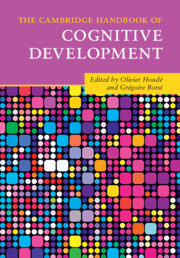Book contents
- The Cambridge Handbook of Cognitive Development
- The Cambridge Handbook of Cognitive Development
- Copyright page
- Contents
- Figures
- Tables
- Contributors
- Introduction
- Part I Neurobiological Constraints and Laws of Cognitive Development
- Part II Fundamentals of Cognitive Development from Infancy to Adolescence and Young Adulthood
- Part III Education and School-Learning Domains
- Index
- Plate Section (PDF Only)
- References
20 - Developing Cognitive Control and Flexible Adaptation during Childhood
from Subpart II.2 - Childhood and Adolescence: The Development of Human Thinking
Published online by Cambridge University Press: 24 February 2022
- The Cambridge Handbook of Cognitive Development
- The Cambridge Handbook of Cognitive Development
- Copyright page
- Contents
- Figures
- Tables
- Contributors
- Introduction
- Part I Neurobiological Constraints and Laws of Cognitive Development
- Part II Fundamentals of Cognitive Development from Infancy to Adolescence and Young Adulthood
- Part III Education and School-Learning Domains
- Index
- Plate Section (PDF Only)
- References
Summary
Whereas performance on intelligence tests and their associated IQ indices are typically considered by parents and teachers as a visa for school success, research over the last couple of decades has revealed an even better predictor of life success than intelligence: cognitive control, that is, the goal-directed regulation of attention, thoughts and actions (Blair & Razza, 2007). Even young children, who tend to be ‘all over the place’, prone to tantrums and often engage in socially inappropriate behaviours, are not devoid of cognitive control skills. Emerging cognitive control during childhood supports increasingly complex thinking and reasoning, ensures steady gains in autonomy with age and allows children to respond increasingly adaptively to novel situations where no routine exists or multiple responses compete with one another. As such, cognitive control plays a key role in explicit learning, as it is initially required to guide actions (e.g., to decide on which keys to press while learning the piano), although it is progressively released as the newly learned skill becomes automated (Chein & Schneider, 2012). Furthermore, in the classroom, children need to engage cognitive control to raise their hands before talking, take turns, concentrate, follow instructions and stay on task. Indeed, cognitive control early in life predicts not only attention in the classroom and academic achievement but also other important outcomes such as health, income and relationship quality in adulthood (Daly et al., 2015; Moffitt et al., 2011). Children growing up in poverty generally show less efficient cognitive control than children from higher socioeconomic backgrounds (Noble et al., 2007) and poor cognitive control is often observed in children with developmental disorders (such as autism and ADHD; Christ et al., 2010; Geurts et al., 2004). In turn, poor cognitive control is a major risk factor for learning difficulties, academic failure, and cascading negative outcomes, including unsafe sex, drug abuse, and criminality in adolescence and adulthood (Moffitt et al., 2011).
Information
- Type
- Chapter
- Information
- The Cambridge Handbook of Cognitive Development , pp. 452 - 471Publisher: Cambridge University PressPrint publication year: 2022
References
Accessibility standard: Unknown
Why this information is here
This section outlines the accessibility features of this content - including support for screen readers, full keyboard navigation and high-contrast display options. This may not be relevant for you.Accessibility Information
- 2
- Cited by
